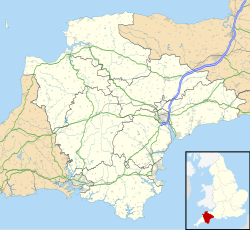| Boasley Cross | |
|---|---|
 Boasley Cross Methodist chapel | |
Location within Devon | |
| OS grid reference | SX5093 |
| Shire county | |
| Region | |
| Country | England |
| Sovereign state | United Kingdom |
| Police | Devon and Cornwall |
| Fire | Devon and Somerset |
| Ambulance | South Western |
Boasley Cross is a village in Devon, England. It is home to the small Boasley Cross Primary School and Boasley Cross Chapel. [1] [2]
